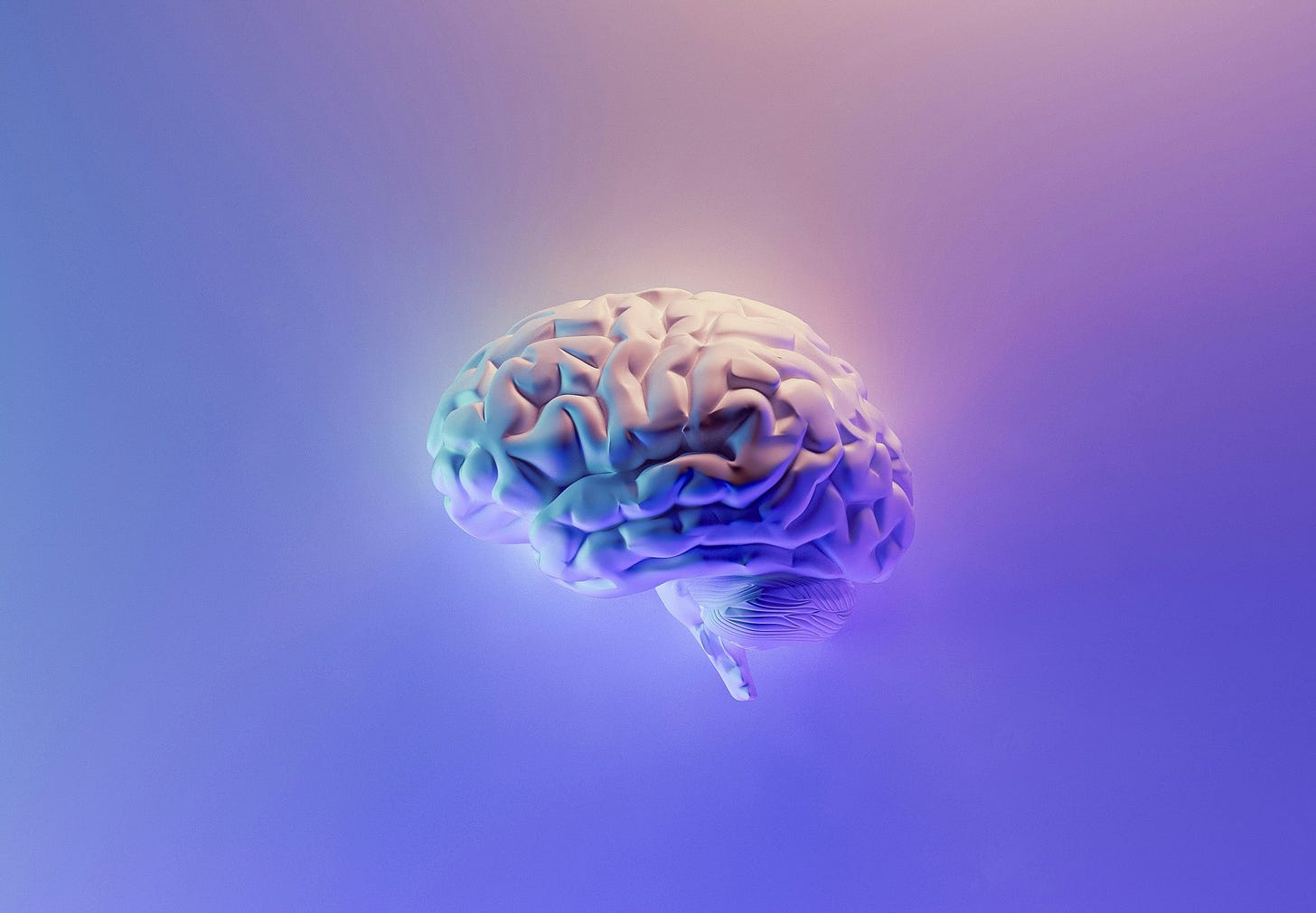To AI or not AI
That is the question…well my question anyway
It’s a question I’ve been contemplating for a while - months, maybe even over a year. As the use of AI services like ChatGPT become more mainstream, and as more people around me are using ChatGPT to solve all their life problems and more, something just hasn’t sat right with me.
I’m not saying there isn’t a place for it, I can definitely see the benefits, but I am also in dread of what a world dependent on AI looks like. For humans and the environment. I flip between the two stances and I don’t think there is a definitive answer, it’s up to us how we use it so it helps rather than hinders our evolution.
I’ve used ChatGPT both personally and professionally with the free version, I’ve not used it excessively and I’ve only recently had access to the paid version so I’m yet to fully explore what that has to offer. Maybe that will change my mind, but hear me out.
Professionally
As a brand and content marketing professional there are many ways AI can take on aspects of my, and my teams’, jobs. I’m sure others in the industry have been taking advantage, as well as those who don’t have the luxury of a marketing department.
AI can plan, write copy and produce graphics for social posts, emails, websites etc. (But just because it can, doesn’t mean it should.)
"You know what the biggest problem with pushing all-things-AI is? Wrong direction. I want AI to do my laundry and dishes so that I can do art and writing, not for AI to do my art and writing so that I can do my laundry and dishes."
—Author Joanna Maciejewska
As any advancement, AI should be making our lives easier by taking on the jobs we don’t want to do. And those that take extensive time, resources and money. Like market research for example. Not many businesses have the resources, time or money to conduct research, particularly into competitors. So utilising AI is massively beneficial and puts smaller businesses on the same level as larger corporations.
What I wouldn’t want to use it for is actually creating content. For two main reasons:
Accuracy:
I’ve had several instances where a colleague or I have written a blog post through AI on something we know very little about (sewing techniques) as a way to create content when an expert is unavailable and the article has been full of errors or misinformation. AI is learning from the internet and, as we all know, the internet is riddled with misinformation.
Images or videos produced, particularly involving humans, appear obviously fake. With extra fingers added in and even an instance where a hand swiped through a needle on a sewing machine. AI is learning though and I’m sure it won’t take long to be able to rectify things like this, if it hasn’t already in the time since the video was created and I’m writing this.
And why would you want to?:
Creating content (to me) is the fun part of the job. A way to be creative and get away from spreadsheets and reports. I appreciate not everyone feels the same way, but for those who work in content marketing, they most likely do that job because they like to create. Without that, it’s just another admin job.
I can also appreciate the benefits of using AI for someone who may need some assistance (for example, if they are dyslexic). I know someone high up where I work who uses ChatGPT to write his emails as he’s dyslexic. He feeds in the bullet points of what he wants to say and ChatGPT spits out a well versed email. Is there any harm in that?
I’ve used it to cut down copy that needs to be under a certain amount of characters. AI doing something in seconds that could take me (let’s face it, after I’ve procrastinated over it) potentially hours.
However, with all these benefits and speedy solutions. Is AI making us lazy? Potentially. But isn’t that what critics said about TVs when they first came into mainstream consumption? And the internet! So is AI just our latest technology that will change the way we live?
There’s one thing making us lazy, but is it also affecting our brains?

An article recently published in TIME that reports on early findings from a research study has found regular use to be extremely detrimental to our critical thinking and even going as far as damaging our neuroplasticity.
While the research focuses on students undertaking schoolwork, it undoubtedly shows how this could affect us at any stage of life.
If we are using ChatGPT to write an email or article, for example, we are unlikely to be taking in any of the information or remember what was written. It’s also likely to be fairly vague and devoid of personality.
Another work example: when asking ChatGPT for brief copy ideas for the craft business I work at ‘unleash your creativity’ is sent back to me 9/10. If it’s not that particular phrasing it’s something else that’s pretty generically corny. So if I’m getting that, what’s to say our competitors aren’t too. Which then results in all the craft businesses selling the same vague ‘dream’ to consumers with none of them standing out as having any personality or authenticity.
Psychiatrist Dr. Zishan Khan, who treats children and adolescents, says that he sees many kids who rely heavily on AI for their schoolwork. “From a psychiatric standpoint, I see that overreliance on these LLMs can have unintended psychological and cognitive consequences, especially for young people whose brains are still developing,” he says. “These neural connections that help you in accessing information, the memory of facts, and the ability to be resilient: all that is going to weaken.”
The report also found that:
the more time users spend talking to ChatGPT, the lonelier they feel.
Like anyone who spends too much time online, gaming or any activity on their own, they miss human connection.
The TIME article, and therefore the research results, sum up what my fears have been very well. It’s worth a read as I have only picked out bits above.
Creativity
In the sense of creative writing and art. I don’t see why people would want to use AI for this. I understand for prompts ChatGPT is great, and even title suggestions when you’re stuck. But I can’t get my head around what you get out of getting it to write the whole thing.
Admittedly, a few Substack posts back, I used ChatGPT to diagnose what your reading habits say about you. This was clearly stated in the piece, as well as the fact that it was all in jest. Plus the fact that I don’t feel I can judge anyone’s reading style. I am definitely no expert, even for a bit of fun.
However, surely the joy of writing and creating is why we write creatively? (Now ChatGPT wouldn’t have written such an awkward sentence repeating two words!) And whether it’s creatively or not, the sense of achievement you get from finishing something like that is not going to be achieved from copy and pasting something from AI. Our happiness and nervous systems need the dopamine we get from the sense of achievement. Without such we are likely to fall into depression.
I have seen many notes on Substack from publishers who have said they are now looking out for and celebrating grammatical and spelling errors in pieces as that at least shows it has been written by a human. And what makes us special is our uniqueness, our imperfections. If we’re all using AI, does that mean we’ll get a repeat of the same ideas over and over? No original thoughts.
The beauty of art and creative writing is in how it makes us feel - our individual interpretations of it and the emotions it evokes. That’s down to it being created by humans. And how do we expect to have the ability to interpret such work if we stop using that part of our brains.
Critical Thinking
The same goes for critical thinking. If we ask AI to interpret or make decisions for us we will soon lose the neurons in our brains that enable us to do that for ourselves. Like any muscle, if you don’t use it you lose it.
Just look at what happens to the aging population when they are isolated as they get older - they get dementia. They lose the neurons in their brains that are formed from social interactions and being in the outside world. And even if they don’t have dementia, they are more nervous undertaking tasks outside the home that they spend the majority of their time in.
And even without the brain health decline, again why would you want to? Humans are so nuanced. And what’s right for me in a certain situation might not be right for someone else.
In Davina McCall’s podcast talking primarily about dementia, brain health expert Dr. Sabina Brennan, talks about how AI learns from the human brain but our brains are still far more complex.
So very often than not, your ChatGPT is just going to reflect yourself back to you.
And as with the interpretation of art, the beauty in decisions made by humans comes from our lived experience which AI doesn’t have.
I sound like I’m totally against the use of AI, which is not the case. I’m against the reliance of AI and the damage it could cause. I haven’t even touched on the environmental aspects of using AI (this is fairly long so I won’t go on about that too!). I’m also conscious that we already live in a world where the content we consume is targeted to us, to mould our opinions and reinforce ideals. It’s only a matter of time before AI does that too, if it hasn’t already.
There are a few things I do think it’s very handy for:
Summarising articles - as someone who finds it difficult to consume large pieces of information (lack of attention span, memory and pure overwhelm), I have found being able to pop a link in Chat GPT and ask it to summarise or pull the parts I want to learn from it very helpful.
Developing a meal plan - rather than spend hours, days, then giving up, I asked ChatGPT to give me a 7 day meal plan for a pescatarian who needs to reach the calories and grams of protein prescribed from my personal trainer. Makes sticking to it and having a varied diet so much easier.
Content ideas - idea prompts more than actual ideas. For when I’m feeling stuck. Or even poetry prompts.
Seeing what my dog would look like as a human - pure fun and probably not the best use of AI.


To summarise - it’s here and we should learn to adapt AI, but not for everything. Don’t turn your brain to mush and ruin everything that’s special about human existence because it’s faster to ask ChatGPT. Our nervous systems also need a bit of uncomfortability in life too so reliance on AI takes that away from our brains.
As I said at the beginning, I am at the start of my journey with AI and am exploring how we can use it from a brand and content marketing perspective. I can see there will be ways to use it, but making decisions and creating content are not that. The TIME article also said:
A Harvard study from May found that generative AI made people more productive, but less motivated.
Reinforcing the need to have achieved something. Once you get the first dopamine hit, you want more!
Disclaimer: while I have taken some insight from articles like the one in TIME and podcasts (see below), the above is my opinion and take on what I’ve learnt. There may be factual errors along the way, I am only human. But that’s what’s great about being human isn’t it - our opinions! Below are just some of the sources/things I’ve read or listened to on AI - there have been way more as I’ve hyperfixated on it a bit. I encourage you to read/listen yourself as you may take something different from them - I’ve not necessarily agreed with everything they’ve said, again I’m using my own critical thinking there!
This also only discusses the use of AI and not the damaging effects it has on us consuming AI generated content. The images and video content that have and will undoubtedly be created that look very real but enforce views based on lies.
Sources:
TIME article: https://time.com/7295195/ai-chatgpt-google-learning-school/
Davina McCall podcast:
Uncensored CMO podcast:
Substack report: I’ve only just read this so I didn’t reference here but it’s worth a read too




